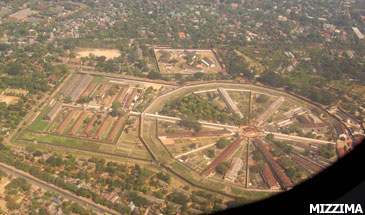The chairman and members of Burma’s National Human Rights Commission visited Insein Prison, the Hlay-Hlaw-Inn Yebet Prison Labour Camp and Myitkyina Prison and issued a statement published in The New Light of Myanma this week.
The full text of the unedited statement is as follows:
Statement by the Myanmar National Human Rights Commission on its visits to the Insein Prison and Hlay-Hlaw-Inn Yebet Prison Labour Camp
1. An eight-member team of the Commission, headed by its Chairman visited the Insein Prison on 27 December 2011 and the Hlay-Hlaw-Inn Yebet Prison Labour Camp in Hlegu Township on 28 December 2011. Earlier a four-member team of the Commission visited Myitkyina Prison on 9 December 2011. The visits provided a valuable opportunity to observe at firsthand the daily lives of the prisoners and the general conditions in which they are serving their respective prison terms. In this regard, the Commission is grateful for the full cooperation extended by the prison authorities.
2. During the visits to Insein Prison and Hlay-Hlaw-Inn Yebet Prison Labour Camp, the team was briefed by the prison officials that management of the prison was based on the Myanmar Jail Manual and UN Standard Minimum Rules for Treatment of Prisoners. The team observed the provision of health care and recreational facilities, serving of daily meals, provision of linguistic and computer training, conduct of formal education classes and religious activities carried out in the prison.
3. The Commission had received communications from different chapters of the Amnesty International alleging that the prisoners who recently staged a hunger strike were put in “dog cells,” maltreated and deprived even of water.
4. During the visit, therefore, the team interviewed three prisoners who took part in the recent strikes.
5. All prisoners interviewed stated that they were not deprived of water and were provided with medical attention both during and after the strikes. The allegations regarding “dog cells” also proved to be untrue. The hunger strikers were each held in cells measuring 10 feet by 22 feet which were clean and property ventilated.
6. During the visit to Hlay-Hlaw-Inn Yebet Prison Labour Camp, the team observed the camp facilities and interviewed a number of prisoners, who expressed their views and concerns in a candid manner. The camp authorities took notes of them with a view to taking corrective actions.
7. Based on the tour of the prison and the interviews, the Myanmar National Human Rights Commission wishes to make the following observations and recommendations:
- The number of prisoners in the Insein Prison far exceeds its maximum holding capacity. The Commission finds this prison congestion as an important source of grievances which should be addressed in a timely fashion.
- The provision of meditation sessions, in the view of the Commission, has a salutary effect on the prisoners’ state of mind in the long term and its continuation is strongly recommended.
- Bible studies for Protestants and Confessional and Communion Services for Catholics and suitable religious programs for Muslims and Hindus should also be organized as appropriate. In this regard, the Commission is pleased to find a chapel, a mosque, a Hindu temple and Buddhist shrine on the prison premises.
8. All prisoners interviewed expressed their ardent hope for the granting of the next general amnesty by the President of the Republic of the Union of Myanmar. In this regard, the Commission would like to recall that it had appealed to the President on 12 November 2011 for the release of the remaining prisoners who do not pose a threat to the stability of the State and public tranquility. The Commission would earnestly like to reiterate this appeal.
Myanmar National Human Rights Commission,
30, December, 2011;
Yangon



